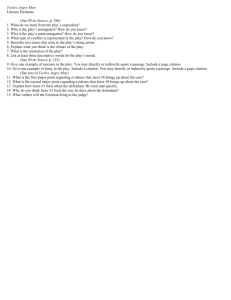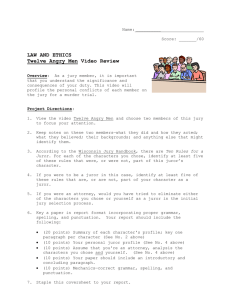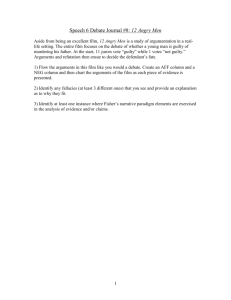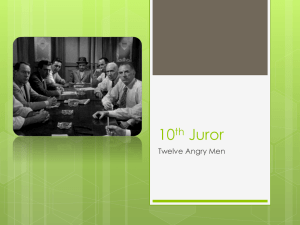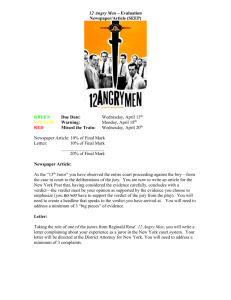TAM Assignments
advertisement
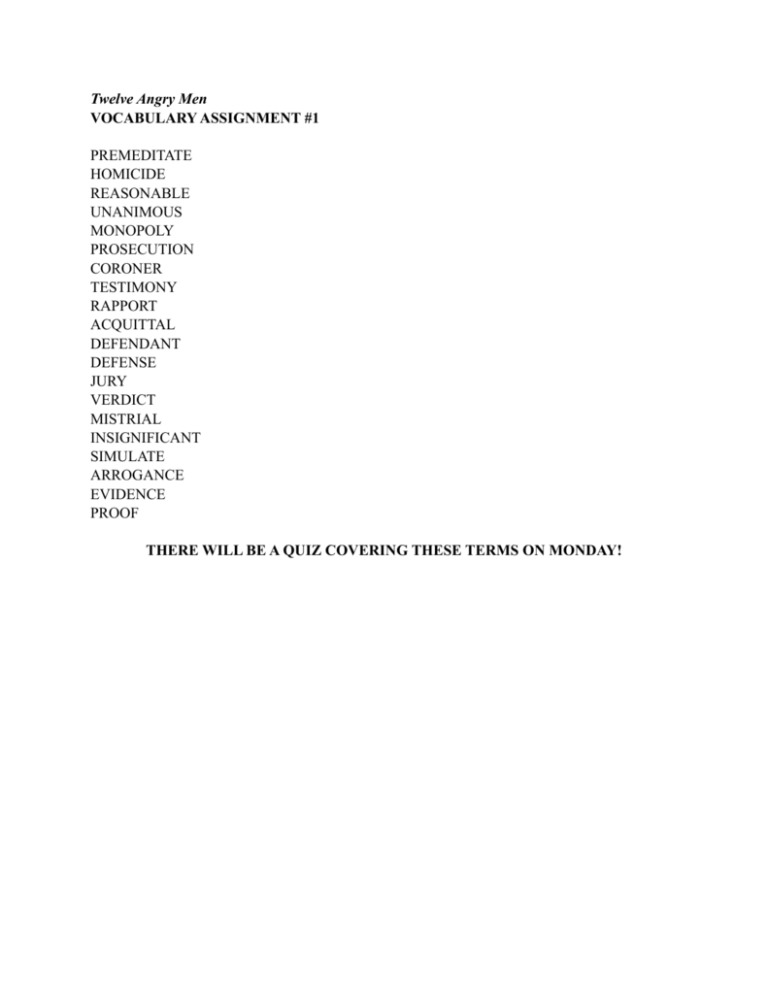
Twelve Angry Men VOCABULARY ASSIGNMENT #1 PREMEDITATE HOMICIDE REASONABLE UNANIMOUS MONOPOLY PROSECUTION CORONER TESTIMONY RAPPORT ACQUITTAL DEFENDANT DEFENSE JURY VERDICT MISTRIAL INSIGNIFICANT SIMULATE ARROGANCE EVIDENCE PROOF THERE WILL BE A QUIZ COVERING THESE TERMS ON MONDAY! Assignments for Twelve Angry Men We will be reading the drama Twelve Angry Men in class. Parts will be assigned for each of the three acts. The characters of the play are jury members deliberating to arrive at a verdict. We learn about the trial through their discussions and interactions. We also learn about the individual twelve men who compose the jury, why they are angry, and how that affects their decisions. The following assignments should be worked on during class time allowed and completed for homework as necessary. I. Vocabulary Chart and Stage Diagram: Use the author’s, Reginald Rose, descriptions of the characters found on pages 4-7 of the book. II. Discussion Group/Reader’s Response Log: After each class period reading of the script, each student will complete a response log. This log will consist of questions you will answer in a small group (EACH GROUP MEMBER MUST HAVE THE QUESTIONS ANSWERED IN HIS/HER LOG) and then an INDIVIDUAL reflection on one of two topics. Topic #1 is if you READ A CHARACTER ALOUD: Describe the character you read the part for. What did you learn about him and what do you understand about how he acts and thinks? What did you want to convey about him in your reading of the part. Use at least 2 quotes in your discussion. Topic #2 is if you DID NOT READ A PART ALOUD: Imagine that you are member of the jury. Write your response about the evidence and discussion of the jurors that would influence your decision on a verdict. What evidence is important and why? How do you think you would vote and why? For the grade of an A on the refection = 150 word response For the grade of a B on the reflection = 125 word response For the grade of a C on the reflection = 100 word response For the grade of a D on the reflection = less than 100 word response YOU MUST MARK THE WORD COUNT AT 25 WORD INTERVALS. QUANTITY, QUALITY, AND NEATNESS CONTRIBUTES TO THE GRADE. WORD COUNT ALONE DOES NOT DETERMINE YOUR GRADE! Point Break Down for the Unit: Vocabulary and Stage Diagram Act I Discussion Questions Act I Reading Log Act II Discussion Questions Act II Reading Log Act III Discussion Questions Act III Reading Log Vocabulary Quiz Critical Thinking and TAM Notes on Jury Deliberation Understanding the Characters Unit Test 52 points 40 points 60 points 45 points 55 points 40 points 60 points 20 points 48 points 30 points 10 points 100 points (60 pts Multiple Choice & 40 pts Essay) Twelve Angry Men Vocabulary Word petty dogged meek sadistic appalled naïve dull-witted bullying compassionate shielding antagonistic bigot subservient superficial Juror# Definition Antonym Twelve Angry Men Act I 1. What are the basic facts of the case, including the testimony of two witnesses against the nineteen year old boy? 2. What are some of Juror #8’s reasons for his uncertainty about the defendant’s guilt? 3. What two jurors seem to show prejudice against the defendant? What are their prejudices? 4. Juror #2 thinks the defendant is guilty because “nobody proved otherwise.” How does this conflict with the legal system’s belief of innocent until proven guilty? 5. How would criminal trials be different if defendants were considered guilty until proven innocent? 6. As the jury files into the jury room early in the play, we learn something about the time of day, the weather, and the nature of the room. How do you think these circumstances might affect the jury deliberations? 7. What is the difference between homicide and premeditated homicide? 8. A defendant must be found not guilty if a “reasonable doubt “of his or her guilt exists in the minds of the jurors. What is important about the meaning of reasonable in this phrase? Twelve Angry Men Act II 1. What evidence does Juror #8 first offer to discount the testimony of an old man at the trial? 2. What is the connection between the el train’s noise and the old man’s testimony? 3. What is the importance of Juror #10’s comment that the defendant “don’t speak good English”? 4. At the end of Act II, Juror #3 shouts, “I’ll kill him!” Why is this important at this point in the play? 5. Which juror has emerged as the main antagonist by the end of the Act? 6. Contrast the attitudes of this juror with those of Juror #8. 7. Discuss the definition of Sound Argument and Unsound Argument. Find one sound argument and one unsound argument in Act II. Explain why you judge each sound and unsound. Sound: Unsound: Twelve Angry Men Act III 1. At the beginning of Act III, the jurors vote for a third time. What is the result of this vote Which jurors have changed their votes? 2. What information does Juror #5 provide that shows a piece of evidence to be false? 3. How does Juror #8 prove that the evidence provided by the woman is invalid? 4. Reread Juror #10’s monologue. Explain why most of the other jurors turn their backs on Juror #10 during his speech. 5. At the end of the play, has the jury proven the defendant not guilty? Explain by giving at least 2 reasons why or why not. 6. In some court cases, people can choose to have a jury trial or a bench trial, in which the case is decided by a judge. Having read this play, would you prefer a bench trial or a jury trial? Explain your choice in 4-5 sentences. 7. Read the definition of hasty generalization. Reread the speech of Juror #10 in Act III. Is Juror #10’s argument a hasty generalization? Why or why not? 8. If Juror #8 had not been chosen for this jury, the outcome might have been much different. This play points out how important the role of each juror can be. After reading this play, what questions would you ask if you were responsible for choosing a jury? Essay Question (40 points) You may choose ONE essay to complete. In light of the statement Juror #9 makes, “It takes a great deal of courage to stand alone,” compare the characters of both Juror #8 and Juror #3. Discuss the situations in which they “stand alone” and describe how they behave in these situations. Conclude by defining when standing alone is courageous. The title of Twelve Angry Men directs our attention to the possible motives of all the jurors in their decision of a verdict. Write a persuasive argument for the role of critical thinking in directing anger toward a positive outcome or result. Be sure to include a definition of critical thinking and give specific references for how different characters applied or did not apply these skills.

